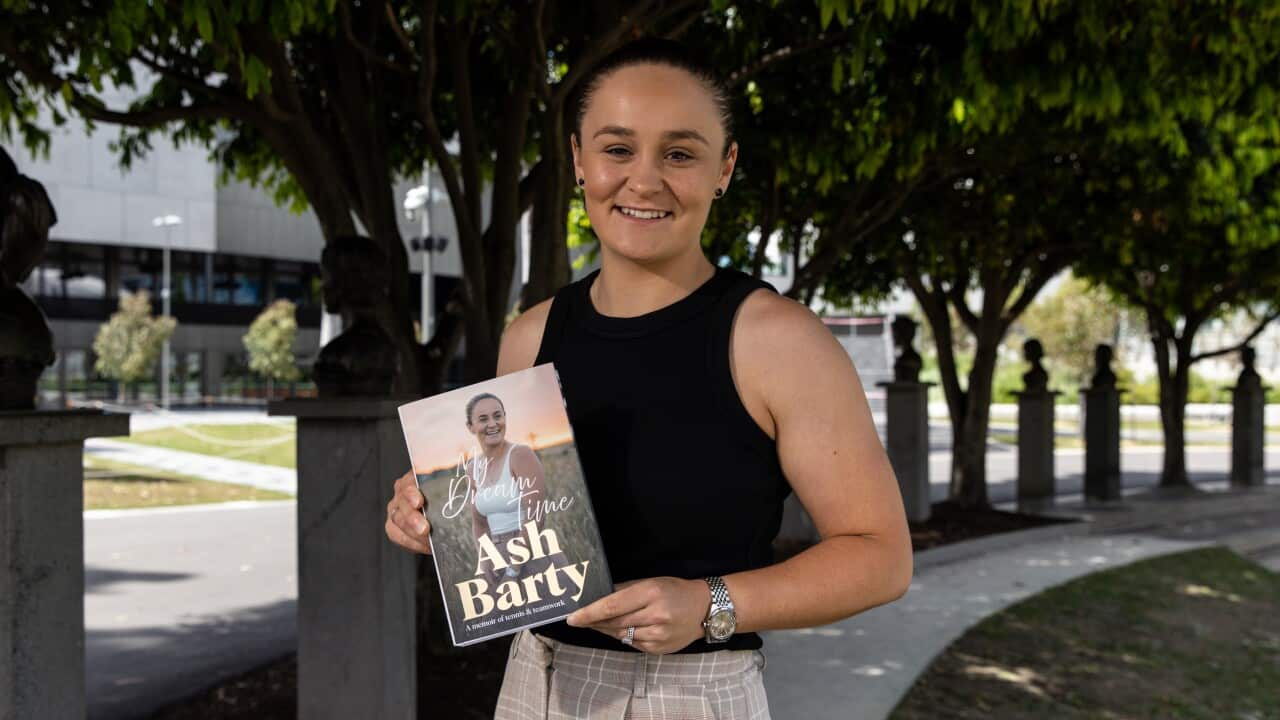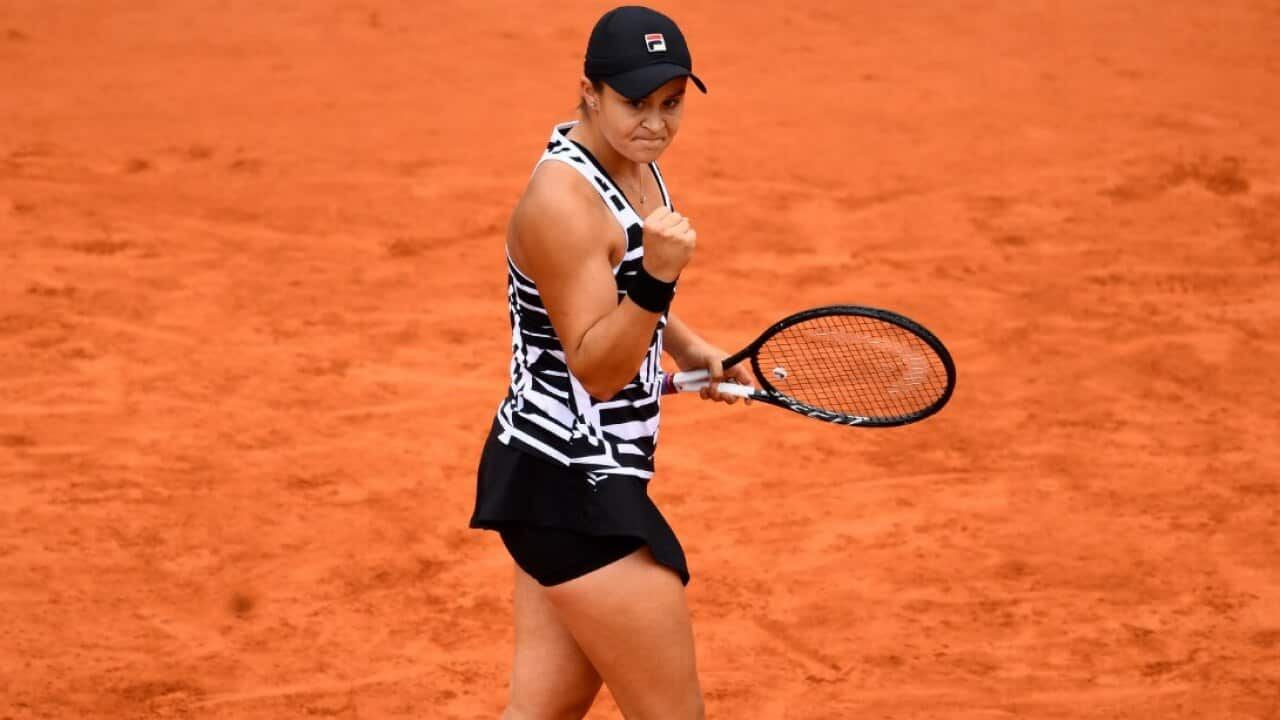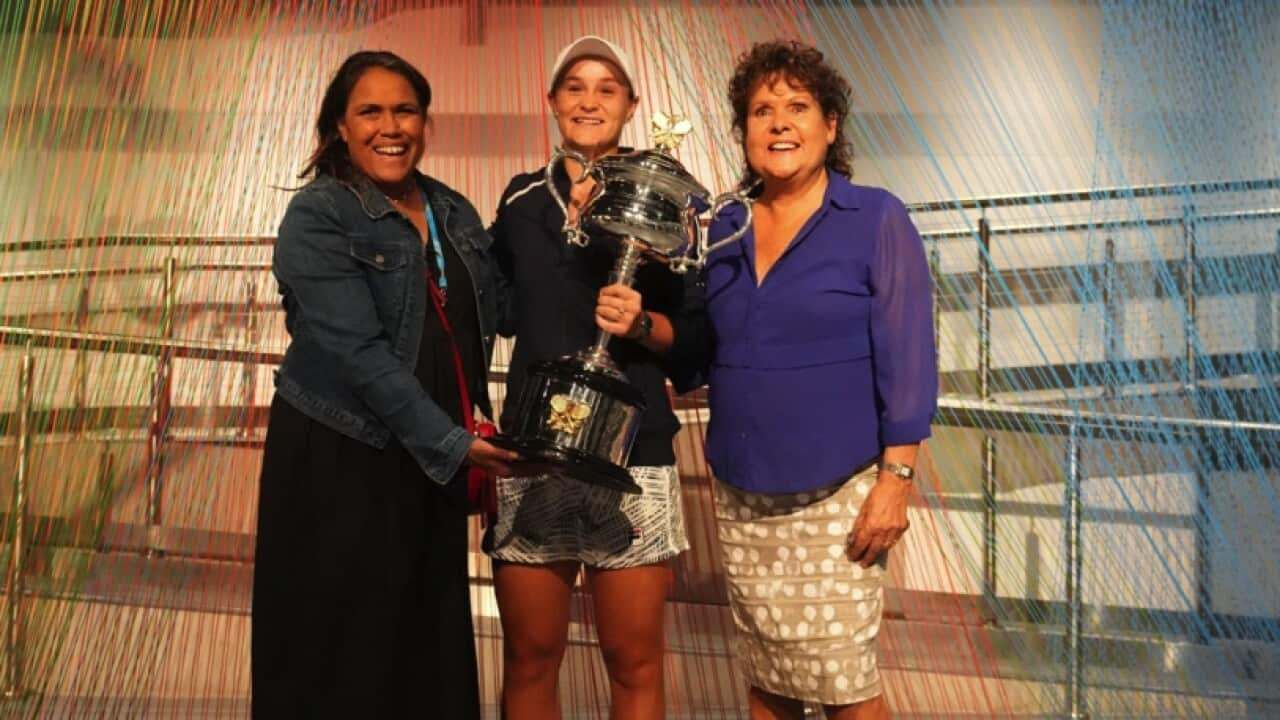At 14, Ash Barty met Evonne Goolagong Cawley.
She was introduced by her father whilst playing her first Junior Australian Open in 2011.
Cawley wrapped Barty in a "gigantic hug" and said she loved the way the youngster played.
From there Barty began researching Cawley, finding out more and more about the odds the Wiradjuri woman had overcome to become a world champion.
These days,, the pair have a strong bond says Barty in her memoir My Dream Time, which hit shelves this month.
"She would reach out to me, to be involved in my life — to observe and mentor, but never to push or compare, or even offer advice, unless I asked," writes Barty.
A steadfast support
When Barty shocked the world with her decision to leave tennis at the top of her game, one of the first names to pop up on her phone was Cawley's.
"Evonne is the kind of person I aspire to be — someone who gives back and can use her experiences and profile to encourage others to be their best," Barty wrote.

Evonne Goolagong Cawley celebrated with Barty after she won the Women’s singles final of the Australian Open. Source: AAP / Joel Carrett
While Cawley has been a mentor for Barty on the court, she's also been there for her in the face of racism.
"I've seen glimpses and tasted the faintest bitter edge of racism. I'd win a Deadly Award but get vilified online. I'd become a Tennis Australia First Nations Ambassador and then find some muppet calling my heritage into question," Barty wrote.
"I've been lucky to have so many incredible role models who have paved a path for me to believe, as a First Nations woman, that I am capable of anything."
A proud Ngarigo woman
Barty was seven-years-old when her father told her she was Ngarigo.
She always knew she was different, with olive skin and her "squishy nose". Finding out made her walk taller.
Barty's father Robert made it his mission to tell his three daughters about their heritage when they were "old enough to understand", something that had been denied him.
Robert found out about the family ancestry through a cousin, who at 13 told him in secret.
"Dad asked his parents about this, but they told him a lie," Barty writes in the memoir.
"To his parents, Aboriginal ancestry was something to be ashamed of and not something to be curious about."
At 17, Robert had pieced together his family tree, confirming that he was a Ngarigo man.

A young Ash Barty celebrates a win in Brisbane, 2002. Source: Supplied
Barty and her father travelled together to Kambu Aboriginal and Torres Strait Island Corporation for Health where they connected with Elders to confirm their Aboriginality.
Barty said it was a moment she'll never forget.
It gave me such joy.
"Dad helped compile our family history into a long book, an archived paper trail of birth certificates and marriage records," Barty wrote.
"He stood in front of the Elders, and spoke his truth, and they approved what they heard and read.
"Our names were recorded as members of the Ngarigo Nation. It was official. We were proud First Nations Australians."

Barty's book discusses her identity journey. Source: AAP / Diego Fedele
“Knowing that we were a little different from everyone else, that we were connected to more people throughout the nation ... gave me a sense of pride," she wrote.
“It gave me such joy. That stands in contrast to the sadness I felt for Dad, whose parents could never admit it to themselves or others – who wanted to hide this thing that I wanted to share, to understand, reconcile and celebrate."
'I'm from there'
Barty has smashed records across the globe, tucking multiple world titles and championships under her belt.
For most, she's represented Australia, but there was a powerful moment at the Tokyo Olympics where she was able to represent her Ngarigo roots.
In the Australian section of the Olympic Village, hung a map of Australia, designed for First Nations athletes to place a pin on where they were from.
Despite hailing from Queensland, Barty put her pin on her ancestral Country.
"I didn't put mine in Ipswich or Bowen - I stuck it squarely on the border of Victoria and New South Wales, where Ngarigo roamed," she wrote.
"A single red pin to represent my tribe, my family. I've never been there but I'm from there."

Barty competed in the Tokyo 2020 Olympic Games. Credit: Clive Brunskill/Getty Images
Paying respects and paving the way
Barty said it was an opportunity for the Indigenous athletes in Tokyo to pay homage to who they were, and the athletes that came before them.
"That’s what First Nations Australians do right? We consider all those who come before us – the light touch of the steps they took, and the big shoes we have to fill," she wrote.
"We remember the darkness they faced and the stereotypes they rejected. And the achievements and accolades that will be forever remembered."
Barty paid respect to Jardwajali cricketer Johnny Mullagh, Yurra Yurra runner Bobby Kinnear, Gundabooka high jumper Percy Hobson, Djiribul jockey Frank Reys and Cathy Freeman.
"We all remember with goosebumps when Cathy Freeman won gold at the Sydney Olympics in 2000," she wrote.
With tennis now behind her, Barty is dedicating her life to ensuring that she isn't the last First Nations superstar in the sport.
"Now I see it as my responsibility to guide First Nations youth and help create opportunity for them to go after their dreams."

Ash Barty with Cathy Freeman and Evonne Goolagong-Cawley following her Australian Open win. Credit: Tennis Australia













